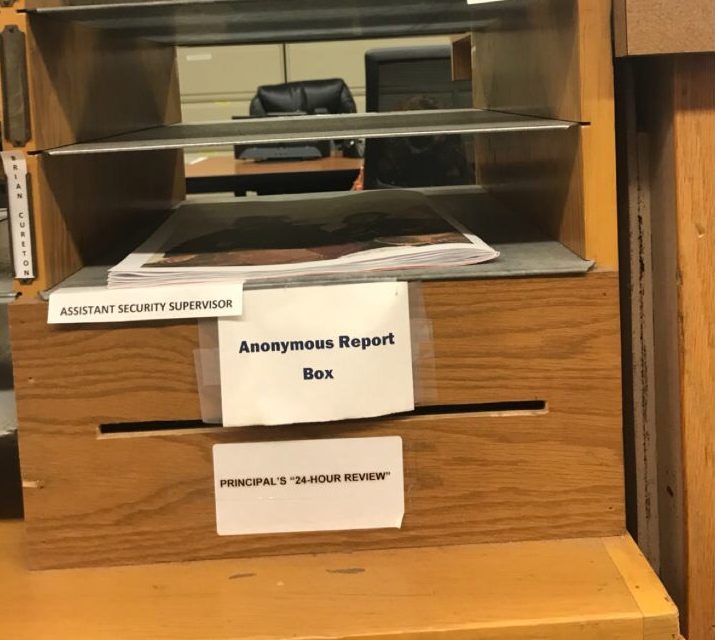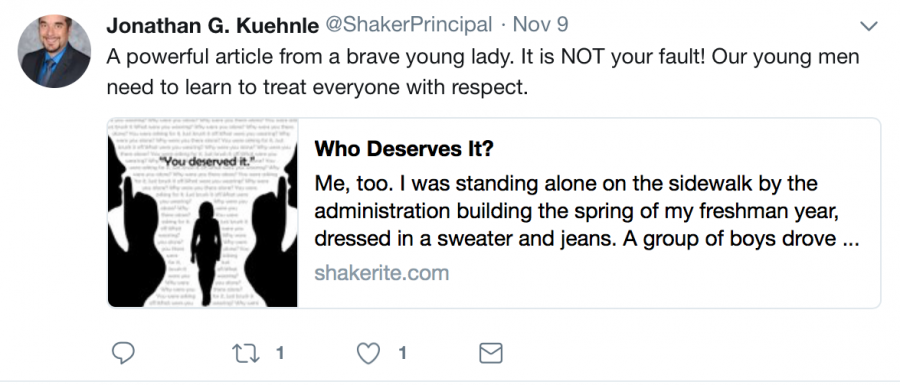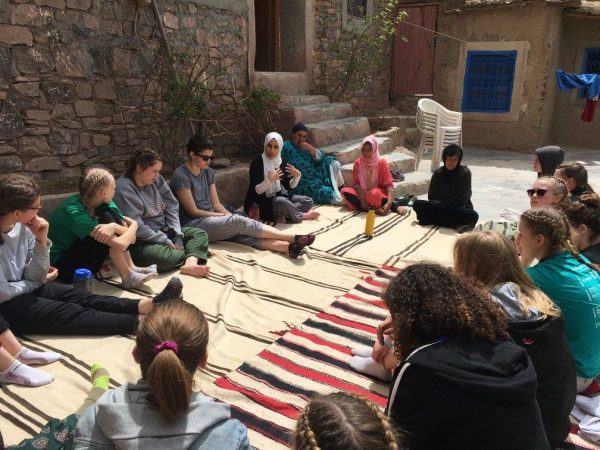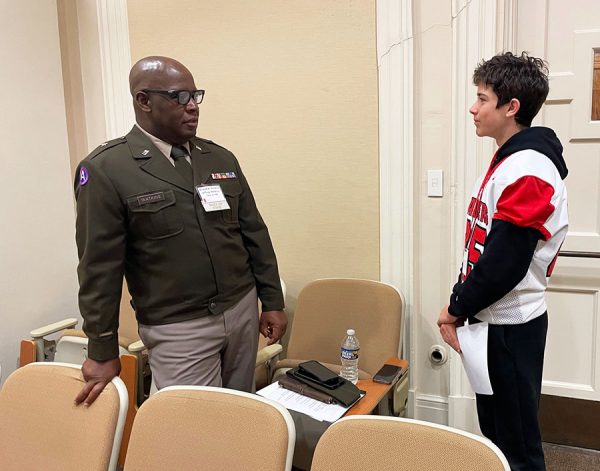Boys Have Lots to Learn
Whether verbal or physical, harassing behaviors are common in Shaker halls
Principal Jonathan Kuehnle posted a Nov. 9 tweet, stating, “Our boys need to learn how to respect girls.” The tweet was in response to Spotlight Editor Ainsley Snyder’s column, ‘Who Deserves It?,’ which described an experience with sexual harassment from boys on school grounds.
A girl is walking to her class, and even during this routine part of the school day, she knows she may be catcalled, called a derogatory name or groped by a boy.
If not, she knows there is a fair chance that she will see one of those offenses happen to another female student.
One female student, who was given anonymity upon request, described her experiences of boys subjecting her to unwelcome physical contact. “I’ve been grabbed inappropriately by a lot by boys of different grades, and they just don’t seem to understand the concepts of personal space and things like that,” she said. “The first time, I felt uncomfortable and felt like maybe I was dressing inappropriately, or I was maybe asking for it.”
The student said that, unfortunately, she has learned to get used to such treatment in the high school.
“Boys will grab girls and act like it’s OK, like it’s fine, but it’s not,” freshman Jacqueline Johnson said. “I see that in the hallways all the time.” Four other students, including boys, who were interviewed, supported Johnson’s claim.
Students also report girls being called derogatory terms. One female junior said that boys often use offensive terms to describe girls, referring to them by slang terms for prostitutes or promiscuous girls. “I just feel like that’s not the right way to refer to anyone,” she said.
“My friends and I have been catcalled a few times in the halls at school,” said another female student in a text message. “I haven’t really thought about it until now, but it really made me feel uncomfortable.”
She said, “It isn’t a situation I should be put in.”
Assistant Head Custodian Carlos Sanchez-Rodriguez has also taken note of boys behavior toward girls at school. He said boys will disrespect girls by “trying to be a bit more powerful and intimidate the girls sometimes.” For example, he saw a boy holding a girl’s hand very tightly, as if to control her.
Donna Jelen, Music Department chairwoman and adviser of Women’s Studies Club, said some boys physically intimidate girls. “A boy sort of blocking a girl’s path in the hallway or taking her water bottle and not giving it back to her — that’s a powerplay. It can be intimidating and even frightening for the girl.”
To some, it is clear that the way boys treat girls at school is an issue. Jelen said, “I know for a fact there are girls that do not feel safe in the building.”
On Nov. 9 Principal Jonathan Kuehnle tweeted, “Our boys need to learn how to respect girls” in response to Spotlight Editor Ainsley Snyder’s column, ‘Who Deserves It?,’ which described an experience with sexual harassment from boys on school grounds.
So the question arises: “What should boys learn about respecting girls?”
While boys need to learn about respecting women, it is important to recognize that not all boys mistreat girls. Custodian Darrel Shaw said, “Most of the boys are very nice and respectful.”
However, a lot of boys at the high school — even those who are not disrespectful toward women — don’t understand which behaviors are acceptable, said freshman Carson Fowler. “It’s just that they don’t understand, because there is a wide range of what’s wrong and what’s right,” he said.
Health teacher Kendra Agee-Barney said, “They would have to learn what respect is and what it looks like to show respect to other people. I think they need to learn to respect toward girls but also respect toward everyone, including themselves.”
“They should learn how to treat women with the respect and equality they deserve,” said math teacher Raymond Durban. “We should certainly not treat them as sex objects or in any demeaning manner,” he said.
“Boys need to know that someone’s appearance is never an excuse for any type of abuse or harassment,” said Jelen. “Women should be free to dress their bodies however they’re comfortable.”
Boys need to be informed of the correct way to refer to a girl, Johnson said. Calling a girl by offensive terms “is definitely not respect, and that shouldn’t be used in schools,” Johnson said.
Respecting girls also means understanding that they, like every other human being, have different and complex emotions, sophomore Maya Hollander said. Boys should not presume that girls feel the same way boys do about interactions.
“They need to learn that we have feelings, too, and it, like our feelings, doesn’t always just go along with what their feelings are,” said Hollander. “We also have different opinions than them and also we can be hurt by what they say or do to us.”
Alexander Leslie, senior director of educational services at the Rape Crisis Center of Cleveland, said boys need to learn the importance of getting permission before touching someone. “The biggest thing [boys] should learn is that whenever someone is in an intimate situation, they should get consent.” Touching, kissing and intercourse all qualify as “intimate situations,” according to Leslie.
Leslie said that even if boys are uncertain about how to treat women they should “stop and ask.”
Although they agree that boys disrespect girls, some Shaker staff believe part of the problem is some girls’ acceptance of this conduct.
“Most of the time, they react like it’s no big deal, but you shouldn’t let people talk to you like that. It sends the wrong message,” custodian Darrel Shaw said.
Durban said because of cultural role models students, girls and boys learn destructive behaviors that ultimately affect their treatment of one another. “I’m afraid that a lot of the role models we have for the behavior come from the culture around them, and in this country we are struggling with treating women with the common courtesy and respect they deserve.”
Nonetheless, students and staff have said that education about disrespectful conduct should not be limited to boys, but provided for everyone.
“It’s not only boys,” said Sanchez-Rodriguez. “I see sometimes girls mistreating the boys.”
“We could all be more respectful to each other, even in our day-to-day conversations,” said Beard. “Especially in how we refer to each other.”
Everyone should learn to ask whether or not certain actions and behaviors toward others are something they are comfortable with, said Leslie. “If there is ever any question about whether somebody is into something that’s happening, they should always stop and ask,” he said.
In response to the misbehavior at the high school, Kuehnle created a “Respect for Women” team as a part of the district’s Strategic Planning Team. As of Nov. 29, Respect for Women Team members include Kuehnle, guidance counselors Catherine Szendrey and Elizabeth Vokes, teachers Bonnie Gordon and Bryan Elsaesser and five students from the Student Leadership Team.
“Our goal will be a comprehensive, school-wide plan,” Kuehnle said. “We want something that is ongoing.”
The week-old team has not yet had a chance to meet and discuss methods for dealing with the issues of disrespect at the high school. “We are very much in the nascent stages of this particular team,” said Kuehnle.
According to Kuehnle, the district is reviewing the health curriculum, particularly the online option from Brigham Young University. “We want to make sure what we offer is comprehensive and objective, and free from any bias — political or religious,” Kuehnle said.

Everyone should help prevent disrespectful actions by making sure there is accountability, Leslie said. “Say, ‘Hey!’ Call it out when someone crosses the line.’”
Leslie said that making sure there is accountability for student actions in school is dependent on the school’s authority figures. Teachers and staff are often relied on “to make sure they believe and listen when someone says they were violated,” Leslie said.
In order for authority figures to address the issues, Kuehnle said,“I would encourage students — just as we said with staff — that if they see something, say something. We can’t address what we don’t already know.”
To report misbehavior, Kuehnle said students should go to staff or a trusted adults. If a student does not feel comfortable, Kuehnle advised using the anonymous reporting box in the main office.
As for teacher responses to reports of disrespectful conduct from students, Kuehnle said, “If someone does come forward with a complaint, you take it seriously. You believe them. You follow the necessary procedures to get them any support if they need it.”
“I think it’s also important that when we see behavior that’s unacceptable we ‘call it out’ — teachers, fellows, students, everybody. If something is inappropriate, we need to address it right away,” said Jelen. “Silence is dangerous. If we stay silent, it just becomes normal.”
“Respect for women and men and, in fact, for everybody else — ” Kuehnle said — “That just has to be a part of our culture here at Shaker.”
Comment using your Facebook, Yahoo, AOL or Hotmail account







